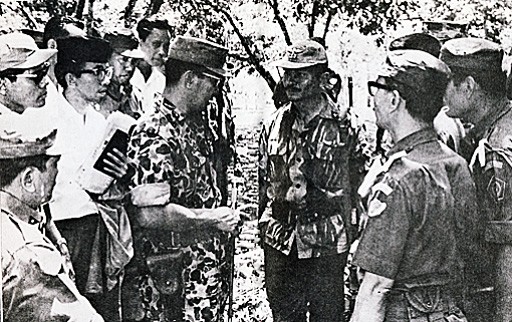Popular Reads
Top Results
Can't find what you're looking for?
View all search resultsPopular Reads
Top Results
Can't find what you're looking for?
View all search resultsSurvivors of 1965 desperately seek rehabilitation
Change text size
Gift Premium Articles
to Anyone
 Dark history -- Maj. Gen. Soeharto briefs members of the Army's Special Forces (RPKAD, now Kopassus) prior to the removal of the bodies of the Army generals who were murdered during an alleged coup attempt on Sept. 30, 1965. The coup attempt was blamed on the now defunct Indonesian Communist Party (PKI). As the most senior military officer available at the time, Soeharto led all the operations to restore security and impose order in the aftermath of the attempt. (JP/30 Tahun Indonesia Merdeka/-)
Dark history -- Maj. Gen. Soeharto briefs members of the Army's Special Forces (RPKAD, now Kopassus) prior to the removal of the bodies of the Army generals who were murdered during an alleged coup attempt on Sept. 30, 1965. The coup attempt was blamed on the now defunct Indonesian Communist Party (PKI). As the most senior military officer available at the time, Soeharto led all the operations to restore security and impose order in the aftermath of the attempt. (JP/30 Tahun Indonesia Merdeka/-)
A
fter more than half a century without clarity on the identity of perpetrators or those who orchestrated the event, some survivors and victims of the 1965 tragedy hope that the government will rehabilitate their names as they have been stigmatized in the past as enemies of the state.
The stigma does not end with themselves, but also extends to their children and grandchildren.
The number of the people affected by the 1965 tragedy, whether murdered, tortured, raped or detained without trial, could reach into the hundreds of thousands.
“I hope the government will rehabilitate all survivors and annul all discriminative laws against the 1965 victims,” said Kusnendar, an 83-year-old survivor, during a two-day symposium on 1965 in Jakarta on Tuesday.
He also expressed his concern that there were still state documents that discriminated against them.
Presidential Decree No. 28/1975, for example, prevents members or sympathizers of the Indonesian Communist Party (PKI) who worked as civil servants from receiving their pensions. Meanwhile, Presidential Decree No. 16/1990 prevents former PKI members from working as civil servants or joining the Indonesian Military.
The kidnapping and murder of six Army generals on Sept. 30, 1965, led to a purge of communists and alleged communist sympathizers by the military under the leadership of Soeharto. In the purge, countless thousands were murdered, tortured and arrested without trial. It is estimated that between 500,000 to 1 million people were killed during the cleansing of people with any leftist connections, regardless of their age or level of connection.
“I was beaten up when I arrived at the Budi Kemuliaan penitentiary as I was accused of being involved in the murder of the generals,” said Kusnendar, adding that he was arrested on Oct. 10, 1965, in Jakarta, because he was involved in a labor union allegedly affiliated with the PKI.
He was also accused of harboring sympathies with the PKI's youth arm, Pemuda Rakyat. Kusnendar moved from one prison to another, including the Cipinang and Salemba penitentiaries in Jakarta, the Nusakambangan prison island in Central Java and Buru Island in Maluku, often remembered as the “Island of Exiles”, in 1969.
Yohanes Winaryo, a 72-year-old survivor, was arrested on Nov. 2, 1965, because of his involvement in the Indonesian Youth and Students Association (IPPI), allegedly affiliated with the PKI.
“We had no affiliation with the PKI as the IPPI just held study-group sessions or sporting events. We even helped the government eradicate illiteracy going door-to-door to the people’s houses,” he said on Tuesday.
However, Yohanes was forced to work without pay as a stonemason in Central Java until he was released in 1970. Since then, he has been “marked” as a former political prisoner.
“Our main demand is rehabilitation. The government should bring back our good name in society. It’s more important than compensation,” he said.
Because of the stigma attached to them, the 1965 victims had to live hard life. Kusnendar was released in 1978 and reunited with his family in Jakarta. However, he said his wife had to divorce him as a prerequisite to working in the Jakarta Education Agency because of his status as a former political prisoner.
Kusnendar earned a living working as an insurance salesman, a scavenger and a thesis typist in a printing shop. (vps/bbn)









